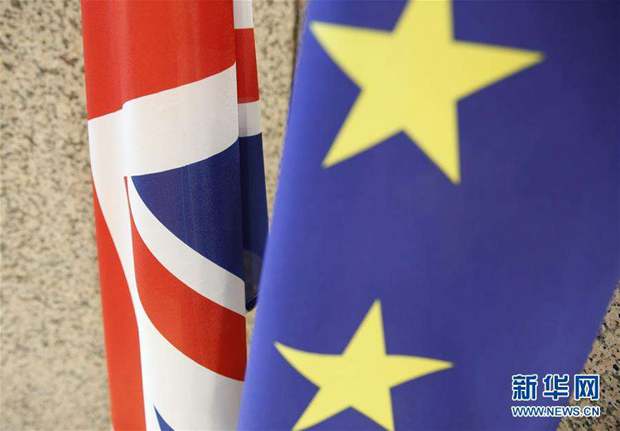Brexit deserves a second vote
- By Mitchell Blatt
 0 Comment(s)
0 Comment(s) Print
Print E-mail China.org.cn, July 19, 2018
E-mail China.org.cn, July 19, 2018

Brexit [Photo/Xinhua]
The most recent crisis for U.K. Prime Minister Theresa May, and for her negotiations to pull Britain out of European Union, has created a frenzy in the press. Brexit Secretary David Davis and Foreign Secretary Boris Johnson resigned in protest within a day of one another because May's plan to leave the bloc was not decisive enough for their tastes.
Other hard-liners are apocalyptically warning of a crisis of democracy if they don't get what they want. Author Brendan O'Neill and his fellow travelers at the website Spiked epitomize this insanity.
"The gap between the public and the political class is so vast now: We vote for sovereign independence and a democratic revival, and they refuse to, or simply can't, deliver on that," O'Neill wrote on July 9.
Only, the original vote on Brexit was far from an overwhelming consensus, and in no way signaled what the great masses of the people want. About 51.9 percent voted in favor of leaving, 48.1 percent voted against it, and nearly 13 million more registered voters didn't cast ballots at all. With a vote this close, it is impossible to know whether or not the results were just a fluke.
The polls showed voters preferring "stay" for months preceding the vote, and tightened only later. Were the vote held in March 2016, the results likely would have been flipped. But if voting just months earlier could have produced the opposite result, how can Brexiteers claim to have truly discerned the will of the people?
William H. Riker touches on this kind of question in his 1982 book, "Liberalism Against Populism." If the outcome of voting may be inconsistent, Riker wondered, then, does not an accident of institutions, rather than popular taste, select the winner? Riker goes on to demonstrate how voting systems themselves influence results. Majoritarian systems may produce different or even contradictory results from proportional systems, for example. If Britons had been allowed to choose between "Hard Brexit," "Soft Brexit," and "Remain," the current situation would likely be quite different.
Of course, the British people have never voted on the plan in any detail. They haven't voted on whether they want to stay in the customs union, whether they want a free trade agreement with the EU, whether they want a hard border in Ireland, or how many migrants they want to allow in each year.
The vote to "leave" then does not necessarily imply support for isolationism. If Britain has no trade arrangement with the EU, its economy will take a massive hit. But if the country maintains such an agreement, it must abide by some of the EU's regulations and tariff policies. While the British people may have favored exiting the bloc in some sense, they certainly did not vote in favor of making themselves poorer.
Members of parliament who wholeheartedly oppose leaving are probably right that Brexit is bad for the U.K. It is imperative for British politicians to protect citizens' economic needs. They should be under no obligation to harm the U.K. just because a majority happened to vote "leave" in a single referendum two years ago.
With Brexit now under negotiation, British citizens have come to see that it isn't as simple or easy as they were promised it would be. Since around June 2017, "remain" has been consistently outpacing "leave" in the polls. The most recent results have British people supporting "remain" over "leave" 45 percent to 40 percent.
If the hard-liners genuinely support the idea that the people should decide the U.K.'s fate by way of referendum, they must be sure of what the people want. Britain should hold another vote when May has negotiated a final deal. If the will of the people is infallible, what do the Brexiteers have to fear?
Mitchell Blatt is a columnist with China.org.cn. For more information please visit:
http://www.china.org.cn/opinion/MitchellBlatt.htm
Opinion articles reflect the views of their authors, not necessarily those of China.org.cn.






Go to Forum >>0 Comment(s)